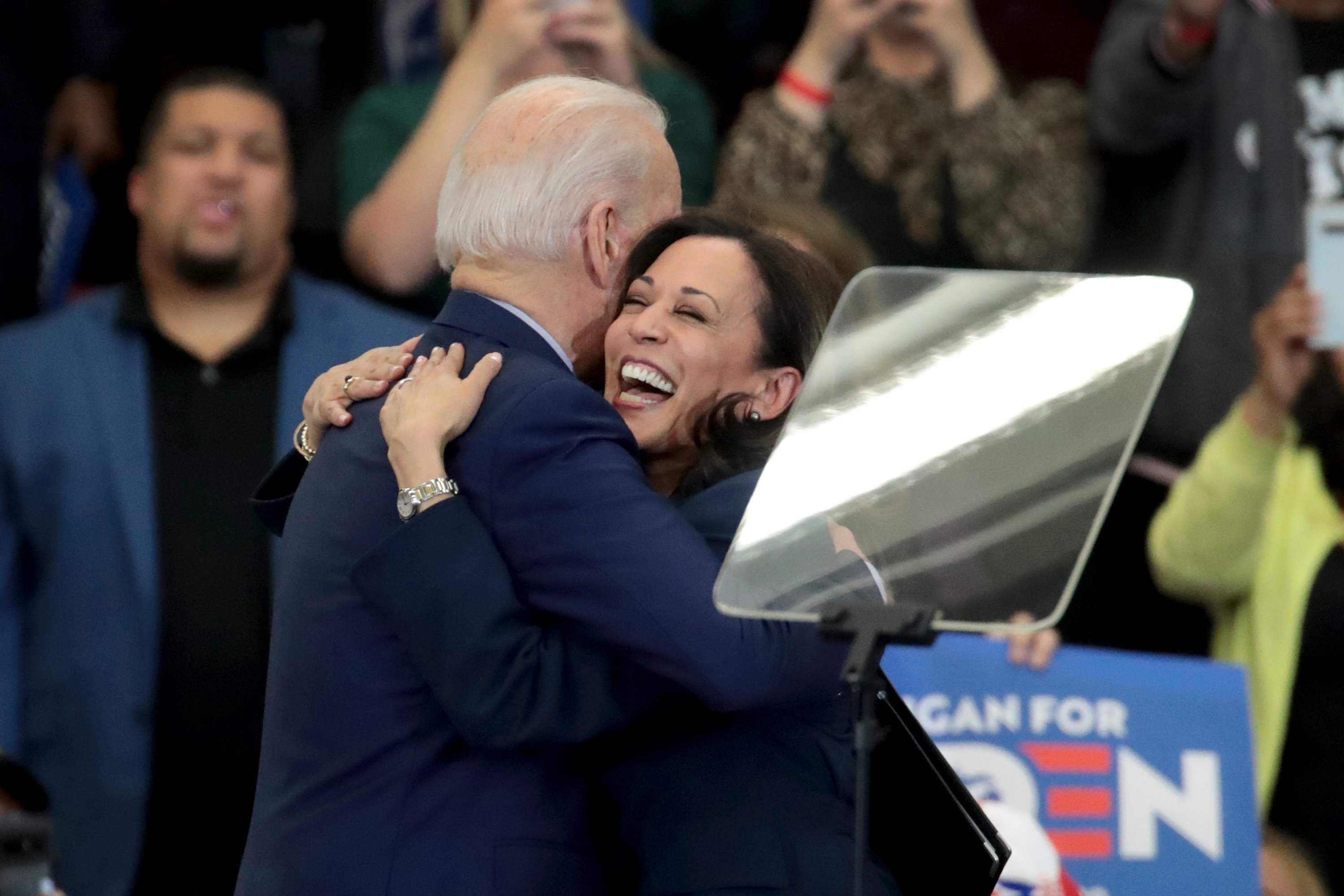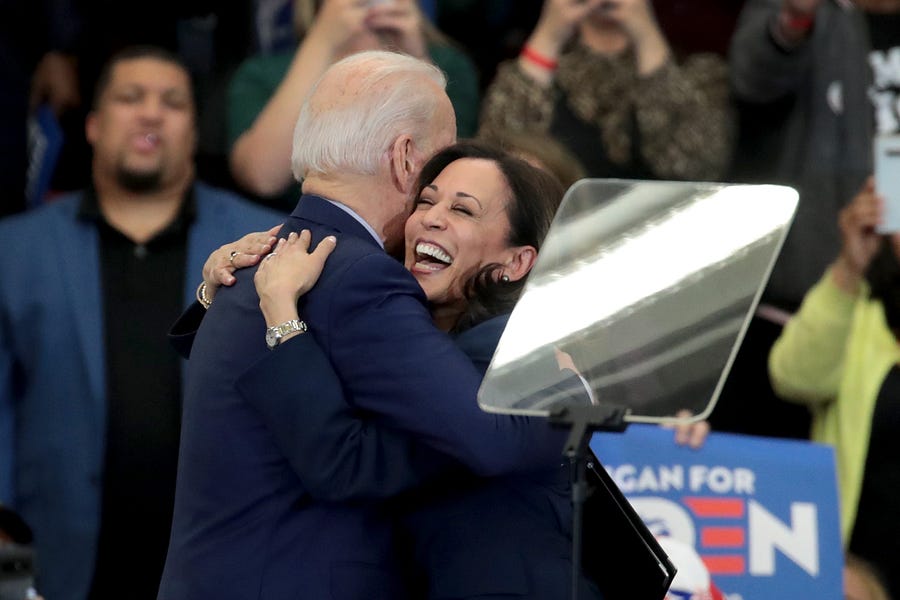Happy Wednesday! If you had Kamala Harris as vice presidential nominee on your 2020 bingo card, you’re in luck.
Quick Hits: Today’s Top Stories
-
The United States confirmed 51,096 new cases of COVID-19 yesterday, with 6.9 percent of the 739,083 tests reported coming back positive. An additional 1,103 deaths were attributed to the virus on Tuesday, bringing the pandemic’s American death toll to 164,528.


-
Fully half of Americans now know someone who’s tested positive for the coronavirus, up from 41 percent last month, according to a new Axios-Ipsos poll. One in five knows someone who’s died.
-
The Big Ten and Pac-12 NCAA conferences announced Tuesday they would postpone all fall sports, including football, until spring at the earliest. Other conferences are still moving forward with plans for their seasons, albeit with truncated schedules.
-
Russia announced Tuesday that it has developed a working coronavirus vaccine and pledged to administer millions of doses to its citizens over the next few months. But the vaccine, which has not been publicly tested or peer-reviewed, is sparking alarm among health experts who warn the country has radically shortchanged crucial clinical testing in its haste to be first off the blocks. “I wouldn’t take it, certainly not outside a clinical trial right now,” former FDA Commissioner Scott Gottlieb said.
-
Another round of Tuesday primaries is in the books: Minnesota Rep. Ilhan Omar won her primary against a well-funded pro-Israel challenger, while QAnon-promoting Republican hopeful Marjorie Greene won a primary in Georgia.
Biden Goes With Harris

Pundits speculated. Political reporters fought to get the scoop. And then the Biden campaign broke the news itself a little after 4 p.m. Tuesday in a text message to supporters:

D.C. conventional wisdom had Sen. Kamala Harris pegged as Joe Biden’s likeliest choice for months. She checked all the right boxes: Female, young (55), black and Indian, scrutinized on a national stage, ideologically centered within the Democratic Party. But her record as a prosecutor is at odds with many on the left’s current feelings toward the criminal justice system, and her withering attacks on Biden in a debate last summer, criticizing him for supporting segregationists and opposing busing, left some advisers in the former vice president’s orbit questioning her loyalty.
But conventional wisdom prevailed, and Harris won out over former National Security Adviser Susan Rice, Rep. Val Demings, Sen. Tammy Duckworth, Rep. Karen Bass, Gov. Gretchen Whitmer, and a handful of others under consideration.
Rep. Jim Clyburn—whose endorsement in the South Carolina primary arguably saved Biden’s candidacy back in February—said he was “ecstatic” with the pick, having long advocated for putting a black woman on the ticket. Former President Barack Obama said Biden “nailed this decision.” Sen. Bernie Sanders tweeted his support for Harris and her understanding of “what it takes to stand up for working people.”
The Trump campaign had months to prepare for Harris’ selection, and quickly released a statement and an ad painting her as “phony.”
“Phony Kamala will abandon her own morals, as well as try to bury her record as a prosecutor, in order to appease the anti-police extremists controlling the Democrat Party,” Trump campaign adviser Katrina Pierson said, illustrating the difficulty of painting Harris as an overzealous prosecutor while simultaneously portraying Biden as soft-on-crime. “Joe Biden is no moderate, and with Harris as his ‘political living will,’ he is surrendering control of our nation to the radical mob with promises to raise taxes, cut police funding, kill energy jobs, open our borders, and appease socialist dictators.”
Asked about Harris’ selection in a press conference a few hours later, President Trump—who donated $6,000 to Harris’ 2014 attorney general re-election campaign in California—pointed to her opposition to fracking and poor performance in the Democratic primary before turning to how “nasty” she was to then-Judge Brett Kavanaugh during his Supreme Court confirmation hearing in 2018.
A Georgetown University Battleground Poll released Monday (that some pollsters criticized for overweighting college graduates) found 43 percent of likely voters have a favorable opinion of Harris, compared with 36 percent who have an unfavorable one. Twenty-one percent of respondents had no opinion of Harris or didn’t know who she was. Her net favorability is higher with women than men (+16 to -5, respectively), and higher with black voters than Hispanic or white voters (+49 to +7 to +2, respectively). Upper class voters approve of Harris 58 percent to 28 percent, while working class voters’ net approval of Harris is -2 and low income voters’ is -3.
Only 19 percent of conservatives and 19 percent of white evangelicals approve of Harris, unsurprisingly. She supports the Green New Deal. She waffled on health care throughout her presidential campaign, but ultimately fell somewhere between an enhanced Affordable Care Act and Medicare for All. She pledged during her presidential run to “take executive action” to ban assault weapons if Congress did not. She sought to discredit a Catholic judicial nominee simply for belonging to the Knights of Columbus. With the 77-year-old Biden viewing himself as a “bridge” to the next generation of the Democratic Party, plenty of conservatives won’t like where that bridge leads.
Still, the impact of vice presidential picks on voter decisions is historically negligible, and Biden maintains an 8.3-percentage-point lead over Trump nationally. Harris may play a slightly larger role in voters’ minds this year because of Biden’s age, but ultimately, as Sen. Mitch McConnell said yesterday, “People will vote on the two at the top, Trump or Biden.”
A Sham Election in Belarus
Protests erupted through the streets of Belarus for the third consecutive night following the fraudulent re-election of president Alexander Lukashenko. Described as “Europe’s last dictator,” Lukashenko has led the former Soviet Republic since 1994—suppressing political dissent and racking up a sizable record of human rights abuses.
Onlookers speculated that Belarus’ economic ruin and disastrous coronavirus response might be enough to topple Lukashenko’s quarter-century rule. But initial election results showed Lukashenko receiving an implausible 80 percent of the vote over his challenger, Svetlana Tikhanovskaya, hinting at a rigged election. Other red flags—including the barring of independent journalists and watchdogs from polling sites and the imprisonment of political challengers—indicate Lukashenko has no intention of ceding power willingly.
As the news of Lukashenko’s victory spread on Sunday, Belarusians (particularly younger ones) gathered to stage one of the largest anti-regime protests of the decade. At least one protester had been killed as of Tuesday night, with dozens more injured as police dispersed protesters using rubber bullets, tear gas, stun grenades and water cannons.
Tikhanovskaya—a former teacher who replaced her husband Siarhei Tsikhanousk as Lukashenko’s opponent after the regime imprisoned him—amassed support, particularly among younger generations, by using platforms like Facebook and Twitter to organize large rallies. Despite the official outcome of the election, Tikhanovskaya insists that she won enough votes to oust Lukashenko. “I consider myself the winner of this election,” she said.
News broke on Monday that Tikhanovskaya had sought refuge in neighboring Lithuania to avoid the vengeance of the sitting government. Maria Moroz, her campaign manager, was reportedly detained ahead of the election last weekend.
Matthew Rojansky, an expert on Eastern Europe at the Woodrow Wilson Center, told The Dispatch that Lukashenko was “trapped between a rock and a hard place” in the face of waning support following the election. “If there are massive protests and he uses violence to crush them, he destroys his warming relationship with the West and he becomes overly dependent on Moscow,” he said. “If he doesn’t hold the line against this opposition wave, he risks not only being deposed domestically, but giving [Russian President Vladimir] Putin an opening to potentially exploit. The Russians would not by any means be above instrumentalizing some opposition force.”
And this is precisely why Belarus occupies a precarious geopolitical position. The country of nearly 9.5 million has often been characterized as a buffer zone between the West and Russia, nestled between two NATO member states, Poland and Lithuania. Belarus is a treaty ally of Moscow, but, as Rojansky pointed out, it would be wrong to describe it as a “Russian puppet.”
Despite close diplomatic and economic ties, Moscow and Minsk have a tumultuous relationship. Lukashenko has made a name for himself by standing up to Putin. Ahead of Sunday’s election, for example, the Belarusian government arrested 33 Russian mercenaries on charges of terrorism. Some pragmatists in the West view Lukashenko as a safeguard against Putin’s attempts to establish quasi-Soviet satellite states in Eastern Europe.
But if Lukashenko persists in his harsh crackdown on internal unrest (and it looks like he will), the United States and its European allies may seek a punitive course of action. Sen. Bob Menendez—the ranking member on the Senate Foreign Relations Committee—called on the U.S. and allies to “swiftly reimpose sanctions on Lukashenka and his associates” if “this violent assault on democratic values continues.” White House Press Secretary Kayleigh McEnany told reporters earlier this week the administration is “deeply concerned by the Belarus presidential election,” adding that the administration urges “the Belarusian government to respect the right of [people] to peaceably assemble and to refrain from use of force.”
The likely outcome of a declining relationship between Belarus and the West is a strengthened relationship between Belarus and Russia. “No man is an island, no nation is an island, and especially Belarus because it has a fundamentally inefficient unreformed economy,” Rojansky said. But when asked if alienating Lukashenko was worth driving Belarus closer to Moscow, Rojansky responded simply: “We lose more by being inconsistent on our principles and values.”
For more on how the international community can help the people of Belarus, read Stephen B. Nix in The Dispatch today.
QAnon Supporter Wins Georgia Primary
Just months after the GOP establishment rid itself of Rep. Steve King in Iowa, conspiracy-mongering candidate Marjorie Taylor Greene won her Republican primary runoff in Georgia’s 14th District last night, leading her opponent, Dr. John Cowan, by 15 points as of early this morning. GA-14 voted for Donald Trump 75 percent to 22 percent in 2016; Greene is almost certainly headed to Congress.
Greene—who Audrey profiled last month—has made clear her support for QAnon, a pro-Trump conspiracy theory that believes a cabal of Satan-worshipping, deep-state elites are running a child sex trafficking ring. In 2017, Greene uploaded a video in which she declared, “Q is a patriot, we know that for sure, but we do not know who Q is.” She’s even given credence to the theory that Clinton has sacrificed chickens in her backyard to the ancient Canaanite deity Moloch.
Greene has said African Americans “are held slaves to the Democratic Party” and that she would feel proud to see Confederate monuments if she were black because they demonstrate the progress American has made since the Civil War. “I know a ton of white people that are as lazy and sorry and probably worse than black people,” Greene once said, discussing unemployment. She classified the 2018 midterm elections as “an Islamic invasion of our government” and has claimed that “anyone that is a Muslim that believes in Sharia law does not belong in our government.”
House Minority Leader Kevin McCarthy, NRCC Chairman Tom Emmer, and Reps. Liz Cheney (R-Wyoming) and Steve Scalise (R-Louisiana) are among the several Republicans who denounced Greene’s comments when they first surfaced in June. But GOP leaders—Scalise aside—did not use the intervening months to rally support behind Cowan; a spokesman for McCarthy told Politico last week the minority leader was letting the primary process play out. Greene did receive endorsements from Reps. Jim Jordan and Andy Biggs and support from an outside group connected to White House Chief of Staff Mark Meadows.
Worth Your Time
-
It’s been a while since we talked about cytokine storms—the autoimmune overreaction to the presence of a disease that doctors increasingly suspect is behind many particularly bad cases of the coronavirus. This New York Times feature from Moises Velasquez-Manoff is an excellent look back over doctors’ gradual, months-long realization that sometimes, saving a patient’s life may require subtly impeding his body’s own virus defenses, and the ethical quandaries and logistical challenges that have accompanied it.
-
In light of the Harris veep pick, it’s worth revisiting this July 2019 essay from Reason’s Elizabeth Nolan Brown, which examined in detail the uneasy tension between the liberal stances Harris has taken since becoming a legislator and her illiberal—even punitive—prosecutorial record as a district attorney and state attorney general.
Something Bipartisan and Heartwarming

Presented Without Comment
Also Presented Without Comment
Toeing the Company Line
-
Check out yesterday’s episode of The Remnant to hear Jonah interview American Enterprise Institute and University of Virginia’s Brad Wilcox on the soundness of the institution of marriage, “family diversity,” and Brad’s plans for if (when?) he becomes Czar of America.
Let Us Know
Will Kamala Harris’ selection as Joe Biden’s running mate matter in November? Does it matter to you?
Reporting by Declan Garvey (@declanpgarvey), Andrew Egger (@EggerDC), Charlotte Lawson (@charlotteUVA), Audrey Fahlberg (@FahlOutBerg), Nate Hochman (@njhochman), and Steve Hayes (@stephenfhayes).







Please note that we at The Dispatch hold ourselves, our work, and our commenters to a higher standard than other places on the internet. We welcome comments that foster genuine debate or discussion—including comments critical of us or our work—but responses that include ad hominem attacks on fellow Dispatch members or are intended to stoke fear and anger may be moderated.
With your membership, you only have the ability to comment on The Morning Dispatch articles. Consider upgrading to join the conversation everywhere.